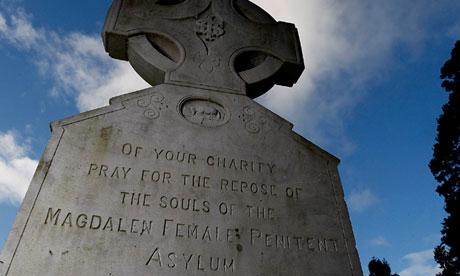Magdalene Laundries: Ireland Accepts State Guilt in Scandal
By Henry McDonald
Report of the Inter-Departmental Committee to establish the facts of State involvement with the Magdalen Laundries Ireland has officially recognised the state's guilt in the "enslavement" of more than 30,000 women, most of whom were sent against their will into church-run institutions where they received no pay, no pension and no social protection. Labelled the "Maggies", the women were sent to the Magdalene laundries where they worked for nothing, serving in some cases "life sentences" simply for being unmarried mothers or regarded as morally wayward. On Tuesday, a report headed by Irish senator Martin McAleese found that the state and the Irish police force bore a major responsibility for sending the women there and failing to protect their rights as workers. The laundries were not private and the vast majority of women and girls were sent there against their own wishes. The McAleese report also concluded that the women were used as free labour and that Irish labour laws from the state's foundation were continually broken inside the laundries. Established in 1922, some of the Magdalene laundries were still in operation as late as 1996. Half of the women incarcerated in these institutions, which washed clothes and linen from major hotel groups and even the Irish armed forces, were under the age of 23. Nuns from the Sisters of Our Lady of Charity ran laundries at Drumcondra and Sean MacDermott Street in Dublin, the Sisters of Mercy in Galway and Dun Laoghaire, the Religious Sisters of Charity in Donnybrook, Dublin and Cork, and the Sisters of the Good Shepherd in Limerick, Cork, Waterford and New Ross. Over 74 years, thousands of single mothers and other women were put to work in detention, mostly in industrial laundries run by nuns. Each inmate entering the laundries had their Christian name changed, her surname unused and at least 988 of those buried in laundry grounds are reckoned to have spent most of their lives inside these institutions. In his findings, McAleese and his co-authors said he hoped that the report would bring "healing and peace of mind to all concerned, most especially the women whose lived experience of the Magdalene laundries had a profound and enduring negative effect on their lives". The key findings are: • More than a quarter of the women held in the laundries for whom records survived were sent in directly by the state. This numbers at least 2,500 women. • The state gave lucrative laundry contracts to these institutions, without complying with fair wage clauses and in the absence of any compliance with social insurance obligations. • The state inspected the laundries under the Factories Acts and, in doing so, oversaw and furthered a system of forced and unpaid labour, in violation of countless legal obligations. The report also investigated the role of the Gardaí in pursuing and returning girls and women who escaped from the Magdalene institutions. "The large majority of women who engaged with the committee spoke of the deep hurt they felt due to their loss of freedom, they were not informed why they were there, they had no information on when they could leave and were denied contact with the outside world, including their family and friends," says the report, adding that the Gardaí "brought women to the Magdalene laundries on a more ad hoc or informal basis". The Justice for the Magdalenes group on Tuesday said it was time to establish a compensation scheme for those who suffered in this system of exploitation stretching over more than seven decades. This had to include, said the group, "the provision of pensions, lost wages, health and housing services, as well as redress, and that is open to all survivors, putting their welfare at the forefront. Magdalene survivors have waited too long for justice and this should not be now burdened with either a complicated legal process or a closed-door policy of compensation." The inquiry into the Magdalene scandal was finally prompted by a report from the UN committee against torture in June 2011. It called for prosecutions where necessary and compensation to surviving women.
|
.
Any original material on these pages is copyright © BishopAccountability.org 2004. Reproduce freely with attribution.
